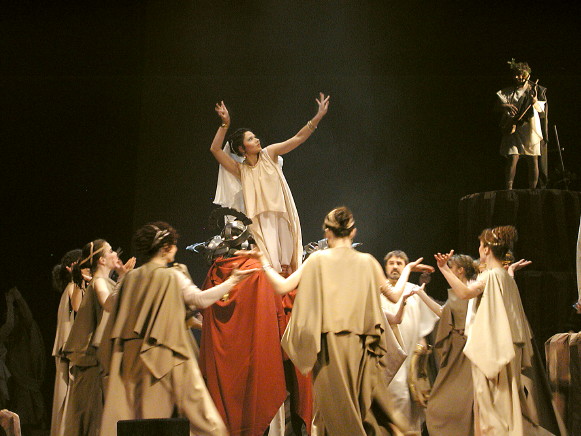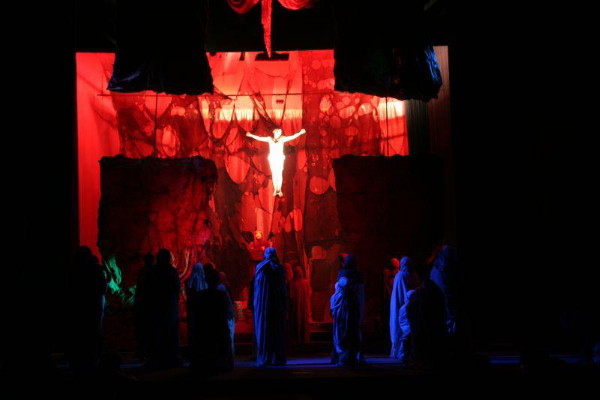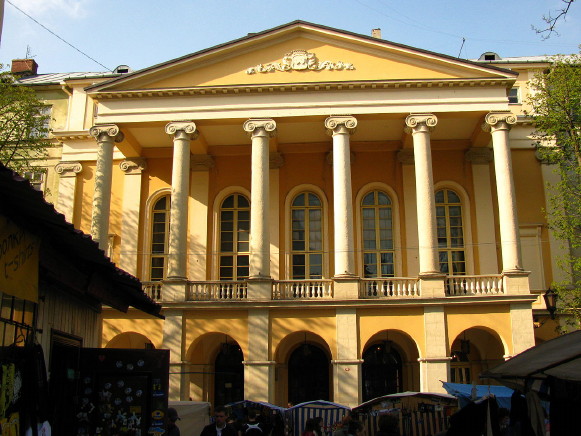Lviv National Academic Ukrainian Drama Theater
Lviv National Academic Ukrainian Drama Theater [Національний академічний український драматичний театр ім. Марії Занковецької; Natsionalnyi akademichnyi ukrainskyi dramatychnyi teatr im. Marii Zankovetskoi]. Founded in 1922 as the Zankovetska Theater from the cast of the People's Theater in Kyiv, it has been one of the foremost drama theaters in Ukraine. In 1923–31 it worked as a touring theater in the Donets Basin and Poltava region, and in 1931–41, as the resident drama theater in Zaporizhia. During the Second World War it worked in Tobolsk, Siberia, and since 1944 it has been based in Lviv and named Lviv Ukrainian Drama Theater. In 2002 it was granted the national academic theater and assumed its present name.
During the 1920s it used renowned Ukrainian actors in the staging of world classics. As a guest director Panas Saksahansky staged Johann Christoph Friedrich von Schiller’s Die Rüauber (1922) and William Shakespeare’s Othello (1926); as well, the theater staged Moliére’s Tartuffe, Carlo Goldoni’s La Locandiera, Lope de Vega’s Fuenteovejuna, Juliusz Słowacki’s Mazepa, and K. Gutzkow’s Uriel Acosta. From the Ukrainian classics it staged an adaptation of Panteleimon Kulish’s novel Chorna rada (The Black Council) and Mykhailo Starytsky’s Ostannia nich (The Last Night). Spyrydon Cherkasenko’s Zemlia (The Land), Volodymyr Vynnychenko’s Chuzhi liudy (The Foreigners), Memento, and Dysharmoniia (Disharmony), and Lesia Ukrainka’s U pushchi (In the Wilderness) were staged from the modern Ukrainian repertoire. Yakiv Mamontov’s Do tretikh pivniv (Until the Third Crowing of the Cocks), Rozheve pavutynnia (The Pink Web), Respublika na kolesakh (Republic on Wheels), Kniazhna Viktoriia (Princess Victoria), and Ioho vlasnist’ (His Property), Ivan Kocherha’s Feia hirkoho myhdaliu (The Fairy of the Bitter Almond) and Marko v pekli (Marko in Hell), and Myroslav Irchan’s Rodyna shchitkariv (The Family of Brush Makers) and Pidzemna Halychyna (Underground Galicia), from the contemporary playwrights; and O. Mirbeau’s Les Mauvais Bergers, M. Pagnol and P. Nivoix’s Les Marchands de gloire, and J. Synge’s The Playboy of the Western World, from the new Western European repertoire. With the beginning of Russification in the 1930s a leading place was given to dramas by Oleksander Korniichuk, Ivan Mykytenko, and Leonid Pervomaisky and to numerous Soviet Russian playwrights, but to only one play from the non-Soviet repertoire, S. Kingsley's Men in White.
In Lviv from 1944, the theater staged Soviet patriotic productions, such as Ivan Chabanenko’s Na Ukraïni mylii (In Dear Ukraine), Leonid Smiliansky’s Muzhyts’kyi posol (The Peasant Representative), and Leonid Pervomaisky’s Dovbush. It also staged contemporary plays, such as J. Priestley’s They Came to a City. Later, notable Ukrainian productions were an adaptation of Ivan Franko’s novelette Boryslav smiiet’sia (Boryslav Is Laughing, 1951) and his Son kniazia Sviatoslava (The Dream of Prince Sviatoslav, 1957), adaptations of Taras Shevchenko’s poems Haidamaky (1963) and Maryna (1964), Lesia Ukrainka’s Blakytna troianda (The Azure Rose, 1968), Mykola Kulish’s Maklena Grasa (1967), an adaptation of Iryna Vilde’s novel Sestry Richyns'ki (The Richynsky Sisters), Oleksander Levada’s Faust i smert' (Faust and Death), Ivan Riabokliach’s Mariia Zan’kovets'ka, an adaptation of Petro Kozlaniuk’s trilogy Iurko Kruk, V. Vrublevska’s Kafedra (The Department, 1980), and Mykola Ya. Zarudny’s Obochyna (The Roadside). William Shakespeare’s tragedies performed have included Hamlet (1956), King Lear (1969), and Richard III (1974). The theater also staged an adaptation of Giovanni Boccaccio’s Decameron (1982) and, from the modern repertoire, Jack London’s Theft and Ferenc Molnár’s The Devil. More recent productions include Anantol Vakhnianyn’s operetta Eve of Kupalo, a vertep-style Oi raduisia, zemle (O Rejoice, Earth), Mykola Kulish’s Narodnii Malakhii (The People's Malakhii), Lesia Ukrainka’s Orhiia (The Orgy), and Yurii Kosach’s Symfoniia sliozy (A Tearful Symphony).
The theater’s main founders were Borys Romanytsky (artistic director until 1948), Oleksander Korolchuk, Vasyl S. Yaremenko, and Varvara Liubart. Its directors have been Ivan Chabanenko, Vasyl Kharchenko, Borys Tiahno, V. Hrypych, Serhii Danchenko, A. Kravchuk, and Fedir Stryhun (since 1987); its scenery designers, Yurii Stefanchuk, Valemtyn Borysovets, and Myron Kyprian (since 1963 the main designer); and its actors, Dmytro Dudariv (Dudariev), Volodymyr Danchenko, Vira Polinska, Nadiia Dotsenko, F. Haienko, Domian Kozachkivsky, Oleksander Hai, Ivan Rubchak, Oleksandra Kryvytska, Bohdan Stupka, L. Kadyrova, B. Kozak, I. Lytvynenko, Mykola Hrynko, and V. Maksymenko.
BIBLIOGRAPHY
Kordiani, L.; Melnychuk-Luchko, L. Teatr im. Zan’kovets'koï (Kyiv 1965)
Kulyk, O. L'vivs'kyi teatr im. M.K. Zan'kovets'koï (Kyiv 1989)
Valerian Revutsky
[This article was updated in 2016.]



